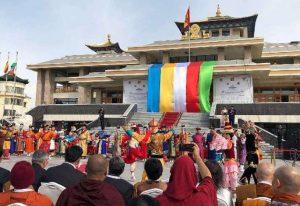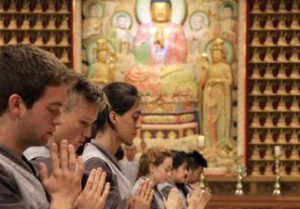After a long interlude in which the Theravada Bhikkhuni Sangha was presumed extinct, the Sri Lankan lineage was re-established in 1998 at Bodhgaya with the help of Chinese Buddhist nuns. Recent progress has inspired many Bangladeshi women to strive for a spiritual life. Motivated by the growing Bhikkhuni Sangha, several received novice (samaneri) ordination under Ven. Varasambodhi Thera in 2011.
However, the Supreme Sangha Council of Bangladesh (henceforth referred to as the Council) not only refused to recognize them, but also rejected their ordination as being illegitimate. Even the monk who ordained these women was excommunicated by the Council and punished with brahmadanda, a form of social exclusion. Despite this, the newly ordained nuns (and the men sympathetic to their cause) continue the struggle for formal recognition.
This is their story.
A Promising Beginning: A Warm Welcome to Ordained Nuns
On Nov. 5, 2011, five women from Bangladesh and two women from Kolkata, India, went to Bodhgaya to receive novice ordination from Ven. Dr. Varasambodhi. They were in the presence of Ven. Dikpala Mahathera, Ven. Dr. Ratanasri, Ven. Bhikkhu Kaccayana (PhD research student at the University of Delhi), among others. They were the first among enthusiastic Bengali women who are deeply motivated by the teachings of the Buddha. Out of the seven women, three intended to devote their entire life to spiritual advancement. To fulfill their journey, they went back to their homeland and hundreds of devotees warmly welcomed their return, showering them with flowers and other offerings.
Among these three samaneris, Rev. Gautami Samaneri, formerly known as Runa Barua, approached the Deputy Sangharaja Ven. Jnanasri Mahathera of the Council to pay her respects. Later, she also paid homage to His Holiness Ven. Dharmasen Mahathera, the Council’s Supreme Patriarch. He expressed his sincere wish that she could continue to fulfill her goal to nibbana. Ven. Pannavamsa, another prominent monk in Bangladesh, invited her to give a Dhamma talk at a village called Pahartali, and in that talk, he introduced her as a female monastic. From that time on, Samaneri Gautami was invited to various Buddhist temples and villages to deliver Dhamma talks.
Based on these meetings with the most influential authorities of the Council, it seemed only a matter of time before the brave fledgling community of nuns would be formally recognized. This was, sadly, a premature assumption.
A Crushing Disappointment: Condemnation and Censure
Although some monks and devotees initially warmly welcomed the newly ordained nuns, the atmosphere of conviviality and generosity was soon replaced by suspicion and contempt. The Samaneri Sangha of Bangladesh had organized an annual anniversary celebration, where twenty women had come to receive novice ordination. They invited about fifty monks to host a huge ceremony. But before the celebrations could take place, the Council summoned a meeting and decided collectively to reject the ordination for women as illegal, citing that it was banned during one of the previous Buddhist Councils. Perhaps tellingly, they were unable to specify which Council in history established this law.
The Council, presumably with the consent of its patriarchs, circulated a leaflet that condemned the mere touching of robes as a sin for women (let alone wearing them). More worryingly, it sent five monks to the nuns’ residence to convey the message that within seven days, they must disrobe. No matter how pleasantly this message may have been expressed, this was effectively a thinly veiled threat. For the nuns, who had just been encouraged by Ven. Dharmasen Mahathera’s endorsement, the Council’s threat must have been a painfully demoralizing blow. Even today, they endure this censure.





Some have suggested that it is Bangladeshi Muslim society as a whole that threatens the Sangha, for monks and especially nuns. For example, Ven. Tilokananda is quoted as writing, “It’s just natural though unjust! Don’t worry but be careful of the ‘danger within nun community’ [sic]. Don’t think that only monks are opposing you all but the culture and civilization are also against the woman [sic]! Wishing best [sic] in the coming future!” (Oct. 25, 2013).
Although Buddhism once declined in Bengal, thanks to the efforts of great monks and laypeople, Buddhism is no longer defined by its absence. Out of sincere concern for the future of Buddhism, some say that women’s ordination in Bangladesh will contribute to a renewed decline of Buddhism. They cite the shortening of the Buddha’s dispensation (sasana) by the initiation of women mentioned in the Vinaya as another factor, though modern scholars have started to doubt the historical validity of this claim.
In spite of such negativity, some monastics and lay followers in Bangladesh are claiming that Buddhist women are oppressed because of various social inequalities, and these inequalities force women to convert to Islam for greater social protection. To counteract the situation, they theorize that female ordination will offer an unprecedented opportunity to maintain their religious identities and will be beneficial to Buddhism’s survival. As Ven. Amritananda declared,
“I cannot understand what is the problem with these bhikkhus regarding women ordination. Why should we try to deny the right of women given by the Buddha himself. I talked to few monks regarding the matter, the logics they have shown to me were irrational and rubbish. They think, if women get ordination, Sangha will get corrupted, I really cannot understand this reason. Good and bad people exist irrespective of gender differences. If each section respects the Vinaya and Dhamma, possess faith towards the Buddha and sincere in his/her spiritual commitment, I think we can build much better society. The problem is these monks are not concerning the safety of Buddha Sasana, but cannot overcome male domination mentality” (Oct. 21, 2013).
Another lay follower, Mr. Ritan Kanti Barua (Religious Secretary, Bangladesh Bouddha Kristi Prachar Sangha), said: “Don’t worry. Please go ahead for Saddhamma. Please tell them to read the Theri Gatha and to know the Dhutanga Brata/Sila (Precepts). To attain nibbana, you have to face as well as overcome all kinds of negative attitude. Buddhism is not heritable (by born) [sic]), it is attained by practicing precepts and meditation” (Oct. 21, 2013).
Where We Stand Today
Although the Supreme Sangha Council of Bangladesh’s directives are clear and unambiguous, the ordained nuns have not disrobed yet and are still struggling to win their recognition as well as monastic rights that the Buddha conferred on women. I have been informed by my sources that these nuns continue to be marginalized and openly derided by monks. This oppression cannot continue without inflicting long-term damage on the Bangladeshi Buddhist community.
In countries such as Sri Lanka and Thailand, women’s ordination has actually been warmly accepted by a sizeable chunk of the population. Even during the Buddha’s time, many women, like Mahapajapati Gotami and Patacara, were eminent propagators of Buddhism in India and excelled spiritually. At present, women should also be granted the rights to practice and achieve Enlightenment, regardless of their background or nationality. Monks like Bhikkhu Bodhi, Bhikkhu Analayo and Ven. Ajahn Brahm, among many others, also assure us that women’s ordination will accord with the Vinaya, and not harm Buddhism.
Women practitioners should be recognized and be welcomed as part of the ordained assembly. We should not forget the example of Dipa Ma from Bangladesh, who achieved very high stages of meditative attainments and contributed greatly to the popularization of Buddhism in the East and West. Many continue to be inspired and spiritually nourished by her, which are examples that both men and women are capable of spiritual development. Plenty of prominent female monastics like Ven. Dhammananda and Ven. Lekshe are able to make unique contributions to Buddhism.
Although Indian society in the Buddha’s time was strictly patriarchal, the Buddha recognized women’s capability in spiritual practice and established the Bhikkhuni Order, one of the crucial fourfold assemblies. Today, gender equality is internationally recognized as a critical component of a civilized society. Many women in the world received higher ordination to fulfill their spiritual journey and continue to propagate Buddhism around the world. In light of this, Bangladeshi Buddhist women should not fall behind other countries in terms of such recognition. At present, there are four ordained nuns in Bangladesh, and they serve as shining examples for future generations of women practitioners.
Reference:
Shramani, Gautami. (Oct. 20, 2013). Article in Bengali – Constant obstruction, threats and humiliation of the victim: Gautami Shramani whose life is inspired by the Buddha’s compassion. Bangladesh: Dhammainfo, Online Newspaper.






